This article was co-authored by Muhammad Khan, MD, MPH. Dr. Muhammad Khan is a Gastroenterologist, with over 10 years of experience. Dr. Khan specializes in Pediatric Gastroenterology, Hepatology, and Nutrition, and has a special focus in Therapeutic Endoscopy. He received his Bachelor’s, Master’s, and Doctorate of Medicine degrees from The University of Utah. Dr. Khan completed his residency training at Eastern Virginia Medical School, where he was inducted into the prestigious Alpha Omega Alpha honor society. He then completed his fellowship training at Lucile Packard Children’s Hospital at Stanford University. He is a Fellow of both the American Society of Gastrointestinal Endoscopy (ASGE) and the North American Society for Pediatric Gastroenterology, Hepatology, and Nutrition (NASPGHAN).
There are 21 references cited in this article, which can be found at the bottom of the page.
This article has been viewed 11,868 times.
Your liver is an incredible organ—it can grow back from almost nothing. But if it’s damaged too often, it can lead to a condition called fibrosis. The good news is you can stop the damage before it gets worse.
Steps
Background
-
1Fibrosis is scar tissue that forms on your liver.[1] Your liver really is an amazing organ. It’s able to heal and repair itself from all sorts of damage. It can even regenerate. As little as 30% of your liver can regrow to its original size.[2] But sometimes when it heals itself, scar tissue can form, which can affect how your liver functions.[3] The scar tissue that forms on your liver is called fibrosis.[4]
-
2Alcohol abuse, viral hepatitis, and non-alcholic fatty liver can cause fibrosis. Scar tissue develops into fibrosis when your liver is repeatedly or continuously damaged. Although your liver is able to repair itself and make new healthy cells when it’s damaged, if it gets injured over and over, the repairs can result in scar tissue. There are a few potential causes of fibrosis, but the scar tissue doesn’t form as a result of a liver condition.[5]Advertisement
-
3Fibrosis can lead to severe scarring called cirrhosis. If fibrosis is widespread and severe, the scar tissue can form bands of scar tissue all throughout your liver called cirrhosis. Cirrhosis can destroy your liver’s internal structure and affect its ability to function and repair itself from further damage. Cirrhosis can lead to serious medical problems and can be potentially life-threatening.[6]
Causes
-
1Years of alcohol abuse can lead to fibrosis. Your liver filters your blood to remove contaminants and toxins. Whenever you drink alcohol, your liver filters it out. If you chronically abuse alcohol, meaning binge drink over a period of years, it can damage your liver and cause scar tissue to form.[7] Binge drinking is described as having more than 4-5 drinks in a 2-hour period.[8] If left untreated, the scar tissue can spread throughout your liver and turn into cirrhosis.[9]
-
2Chronic viral hepatitis can also cause fibrosis. Hepatitis B, C, and D are inflammatory liver conditions caused by a viral infection. If you have a chronic form of hepatitis, where your liver is often inflamed, it can cause damage that can lead to fibrosis.[10]
-
3Nonalcoholic fatty liver disease (NAFL) can sometimes cause fibrosis. NAFL usually occurs in obese people, people who have diabetes (or prediabetes), or people who have high levels of fats and cholesterol in their blood. If there’s too much fat on your liver, it can cause inflammation that can develop into fibrosis.[11]
-
4A buildup of heavy metals can also damage your liver. Hemochromatosis is a condition that causes an iron overload in your liver. Wilson disease causes copper to accumulate in your liver. If you have a high level of heavy metals in your liver, it can damage it and cause the scarring that leads to fibrosis.[12]
-
5Sometimes, the cause isn’t known. It may be frustrating, but sometimes you won’t be able to determine what’s damaging your liver and causing the fibrosis.[13] You could have an inherited genetic disorder that you didn’t know about or take medications that cause damage to your liver, such as methotrexate or isoniazid.[14] The truth is, you may never know exactly what’s causing your cirrhosis.
Symptoms
-
1Fibrosis itself doesn’t cause any symptoms. You could have symptoms as a result of an underlying disease or disorder that’s also causing your fibrosis. But the scar tissue on your liver won’t cause any noticeable symptoms.[15]
-
2If the damage gets too severe, your fibrosis can turn into cirrhosis.[16] Symptoms of cirrhosis include fatigue, loss of appetite, and itchy, yellow skin. You can also have fluid accumulate in your abdomen and have spider-like blood vessels on your skin. In serious cases, you can experience confusion, drowsiness, and slurred speech.[17]
Diagnosis
-
1Your doctor will order blood tests to check your liver function. The simplest, least invasive test is a blood test. Your doctor will draw blood from you and run of series of tests that check for signs of unhealthy liver function.[18] A blood test may be all your doctor needs to confirm a fibrosis diagnosis.[19]
-
2Some non-invasive imaging tests may be able to identify fibrosis. Fortunately, with today’s modern science, your doctor can take a look at your liver using non-invasive imaging like an ultrasound, computerized tomography (CT scan), or magnetic resonance imaging (MRI). These tests can usually confirm whether or not you have fibrosis, but they may not be able to determine how extensive the damage is.[20]
-
3You may need to have a liver biopsy to confirm fibrosis. If your doctor isn’t satisfied with blood and imaging tests, they may choose to take a biopsy. The procedure involves your doctor using a needle to take a small sample of tissue from your liver. They can then test the sample to find out exactly how extensive the damage is.[21]
Treatment
-
1Stopping the cause of the fibrosis is the key to treatment. There aren’t really any other treatments for fibrosis. Once your doctor figures out what’s causing the damage, you can stop using or doing whatever it is that’s damaging your liver.[22]
-
2Antiviral drugs can treat chronic viral hepatitis. If you have chronic hepatitis B, C, or D, there are drugs that can treat and get rid of the virus. Your doctor will be able to run tests to confirm exactly which one you have. Then, you can take antivirals that will cure the infection and stop the inflammation of your liver.[23]
-
3Stop using any drugs or alcohol causing the fibrosis. If alcohol is the cause of your liver damage, stop drinking as soon as you can to prevent further damage. Some drugs and medications can also cause fibrosis. If that’s the case, stop taking them. Your doctor can help you find alternative medications that won’t damage your liver.[24]
-
4Drugs can remove heavy metals if they’re causing damage. If you have a condition such as hemochromatosis or Wilson disease you may need drugs to help your body get rid of them. Once the heavy metals are out of your system, they won’t cause any further damage to your liver.[25]
-
5Losing weight and controlling blood sugar levels can treat NAFL. Nonalcoholic fatty liver can be controlled and even reversed by managing the causes of the condition. If you’re obese or have too much fat and cholesterol in your blood, you can lose weight through healthy diet and exercise to help reduce the amount of fat on your liver. If you’re diabetic, managing your blood sugar levels can prevent damage to your liver.[26]
Prognosis
-
1Your liver can repair itself if you can prevent further damage. Your liver is a super resilient organ. It can heal itself remarkably well. And if your fibrosis hasn’t progressed to full-on cirrhosis, if you can prevent further damage, your liver may be able to fully heal within a few years, depending on how extensive the scarring is.[27]
-
2Managing your symptoms is the main treatment for cirrhosis. If your fibrosis progresses to cirrhosis, the goals of treatment are to slow the spread of scar tissue and treat any symptoms you experience. In advanced cases of cirrhosis, a liver transplant may be the only treatment option. The sooner you can start treatment for cirrhosis, the better you’ll be able to manage it.[28]
Expert Q&A
-
QuestionWhat kind of doctor do you need for liver fibrosis?
 Muhammad Khan, MD, MPHDr. Muhammad Khan is a Gastroenterologist, with over 10 years of experience. Dr. Khan specializes in Pediatric Gastroenterology, Hepatology, and Nutrition, and has a special focus in Therapeutic Endoscopy. He received his Bachelor’s, Master’s, and Doctorate of Medicine degrees from The University of Utah. Dr. Khan completed his residency training at Eastern Virginia Medical School, where he was inducted into the prestigious Alpha Omega Alpha honor society. He then completed his fellowship training at Lucile Packard Children’s Hospital at Stanford University. He is a Fellow of both the American Society of Gastrointestinal Endoscopy (ASGE) and the North American Society for Pediatric Gastroenterology, Hepatology, and Nutrition (NASPGHAN).
Muhammad Khan, MD, MPHDr. Muhammad Khan is a Gastroenterologist, with over 10 years of experience. Dr. Khan specializes in Pediatric Gastroenterology, Hepatology, and Nutrition, and has a special focus in Therapeutic Endoscopy. He received his Bachelor’s, Master’s, and Doctorate of Medicine degrees from The University of Utah. Dr. Khan completed his residency training at Eastern Virginia Medical School, where he was inducted into the prestigious Alpha Omega Alpha honor society. He then completed his fellowship training at Lucile Packard Children’s Hospital at Stanford University. He is a Fellow of both the American Society of Gastrointestinal Endoscopy (ASGE) and the North American Society for Pediatric Gastroenterology, Hepatology, and Nutrition (NASPGHAN).
Board Certified Gastroenterologist You should see a liver specialist, hepatologist, or gastroenterologist to officially diagnose your liver fibrosis and figure out what's causing it. These doctors might need to do blood tests, take an ultrasound, or even take a biopsy.
You should see a liver specialist, hepatologist, or gastroenterologist to officially diagnose your liver fibrosis and figure out what's causing it. These doctors might need to do blood tests, take an ultrasound, or even take a biopsy. -
QuestionHow can you stop liver fibrosis from progressing?
 Muhammad Khan, MD, MPHDr. Muhammad Khan is a Gastroenterologist, with over 10 years of experience. Dr. Khan specializes in Pediatric Gastroenterology, Hepatology, and Nutrition, and has a special focus in Therapeutic Endoscopy. He received his Bachelor’s, Master’s, and Doctorate of Medicine degrees from The University of Utah. Dr. Khan completed his residency training at Eastern Virginia Medical School, where he was inducted into the prestigious Alpha Omega Alpha honor society. He then completed his fellowship training at Lucile Packard Children’s Hospital at Stanford University. He is a Fellow of both the American Society of Gastrointestinal Endoscopy (ASGE) and the North American Society for Pediatric Gastroenterology, Hepatology, and Nutrition (NASPGHAN).
Muhammad Khan, MD, MPHDr. Muhammad Khan is a Gastroenterologist, with over 10 years of experience. Dr. Khan specializes in Pediatric Gastroenterology, Hepatology, and Nutrition, and has a special focus in Therapeutic Endoscopy. He received his Bachelor’s, Master’s, and Doctorate of Medicine degrees from The University of Utah. Dr. Khan completed his residency training at Eastern Virginia Medical School, where he was inducted into the prestigious Alpha Omega Alpha honor society. He then completed his fellowship training at Lucile Packard Children’s Hospital at Stanford University. He is a Fellow of both the American Society of Gastrointestinal Endoscopy (ASGE) and the North American Society for Pediatric Gastroenterology, Hepatology, and Nutrition (NASPGHAN).
Board Certified Gastroenterologist Lifestyle changes can help if your liver fibrosis is caused by alcohol or fatty liver disease.
Lifestyle changes can help if your liver fibrosis is caused by alcohol or fatty liver disease.
Warnings
- Never take any prescription medication without first talking to your doctor.⧼thumbs_response⧽
References
- ↑ https://www.msdmanuals.com/home/liver-and-gallbladder-disorders/fibrosis-and-cirrhosis-of-the-liver/fibrosis-of-the-liver
- ↑ https://www.lahey.org/lhmc/department/transplantation/live-donor-liver-transplant/pros-cons/
- ↑ Muhammad Khan, MD, MPH. Board Certified Gastroenterologist. Expert Interview. 24 August 2021.
- ↑ https://www.merckmanuals.com/home/liver-and-gallbladder-disorders/fibrosis-and-cirrhosis-of-the-liver/fibrosis-of-the-liver
- ↑ https://www.merckmanuals.com/home/liver-and-gallbladder-disorders/fibrosis-and-cirrhosis-of-the-liver/fibrosis-of-the-liver
- ↑ https://www.merckmanuals.com/home/liver-and-gallbladder-disorders/fibrosis-and-cirrhosis-of-the-liver/cirrhosis-of-the-liver
- ↑ Muhammad Khan, MD, MPH. Board Certified Gastroenterologist. Expert Interview. 24 August 2021.
- ↑ https://www.nhs.uk/conditions/cirrhosis/
- ↑ https://www.nhs.uk/conditions/cirrhosis/
- ↑ https://www.ncbi.nlm.nih.gov/books/NBK554597/
- ↑ https://www.niddk.nih.gov/health-information/liver-disease/nafld-nash/definition-facts
- ↑ https://rarediseases.org/rare-diseases/heavy-metal-poisoning/
- ↑ https://www.hopkinsmedicine.org/health/conditions-and-diseases/acute-liver-failure
- ↑ https://www.ncbi.nlm.nih.gov/pmc/articles/PMC3157241/
- ↑ https://www.merckmanuals.com/home/liver-and-gallbladder-disorders/fibrosis-and-cirrhosis-of-the-liver/fibrosis-of-the-liver
- ↑ https://www.ncbi.nlm.nih.gov/pmc/articles/PMC546435/
- ↑ https://my.clevelandclinic.org/health/diseases/15572-cirrhosis-of-the-liver
- ↑ Muhammad Khan, MD, MPH. Board Certified Gastroenterologist. Expert Interview. 24 August 2021.
- ↑ https://www.radiologyinfo.org/en/info.cfm?pg=fatty-liver-disease
- ↑ https://www.hepatitis.va.gov/hcv/liver-fibrosis.asp#S1X
- ↑ https://www.hepatitis.va.gov/hcv/liver-fibrosis.asp#S1X
- ↑ https://www.ncbi.nlm.nih.gov/pmc/articles/PMC2702953/
- ↑ https://hrjournal.net/article/view/2197
- ↑ https://www.msdmanuals.com/home/liver-and-gallbladder-disorders/fibrosis-and-cirrhosis-of-the-liver/fibrosis-of-the-liver
- ↑ https://rarediseases.org/rare-diseases/wilson-disease/
- ↑ https://www.hopkinsmedicine.org/health/conditions-and-diseases/nonalcoholic-fatty-liver-disease
- ↑ https://gut.bmj.com/content/46/4/443
- ↑ https://www.nhs.uk/conditions/cirrhosis/treatment/
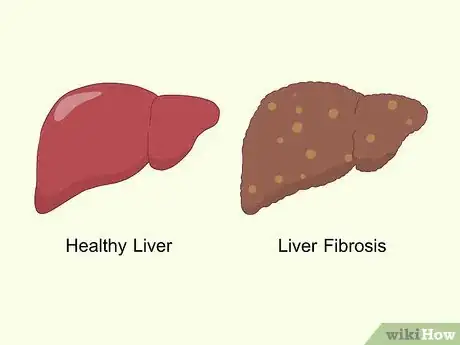

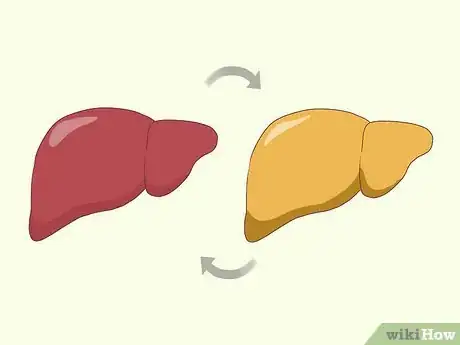
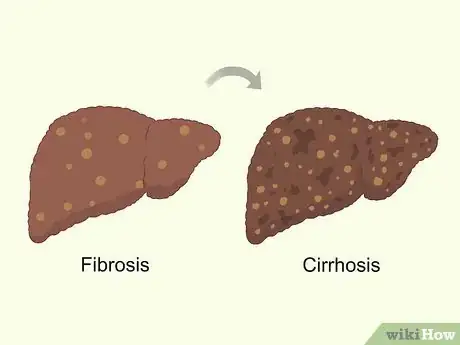
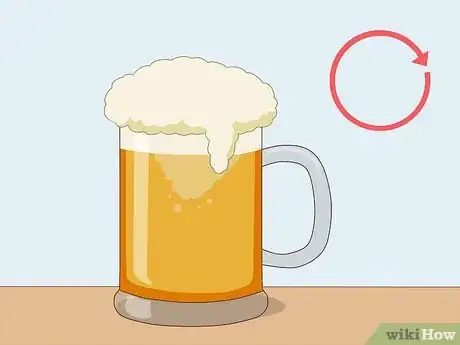
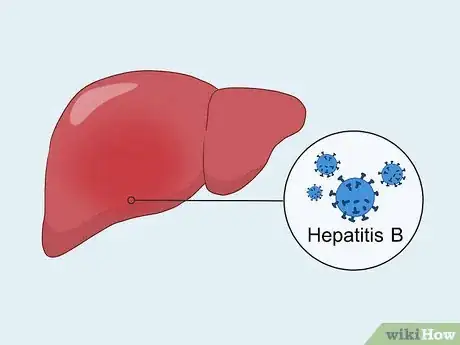
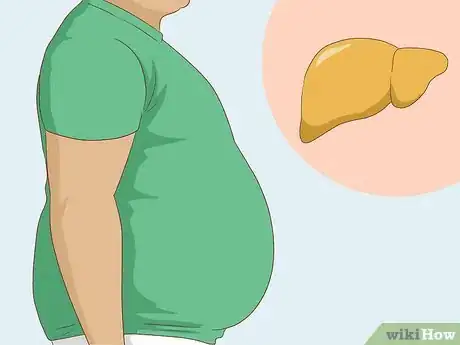
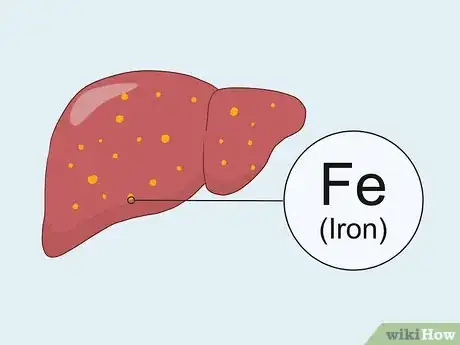
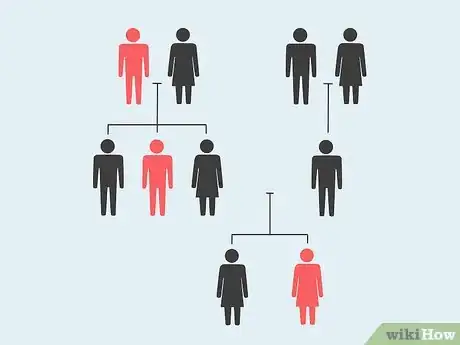
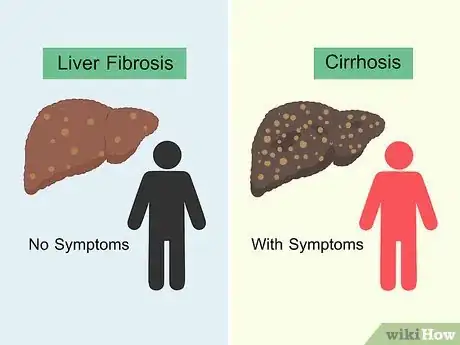
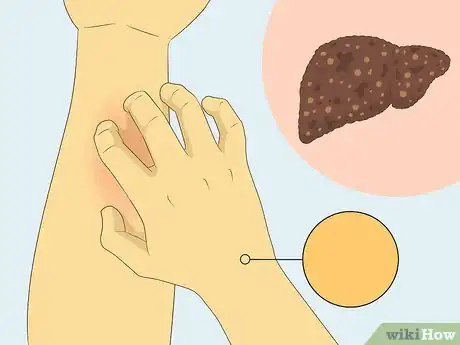
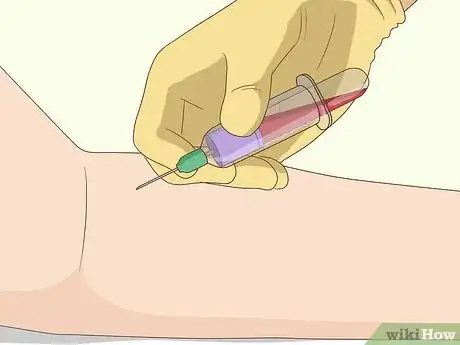
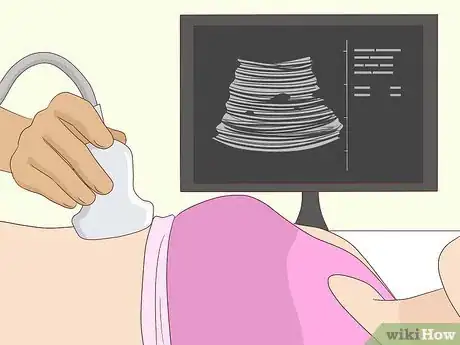
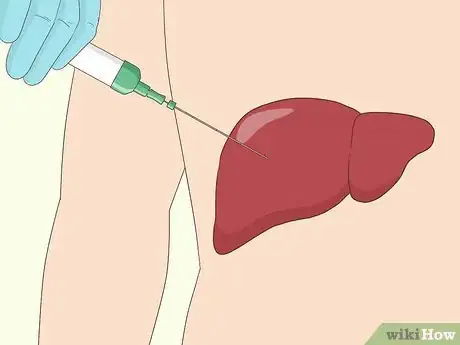
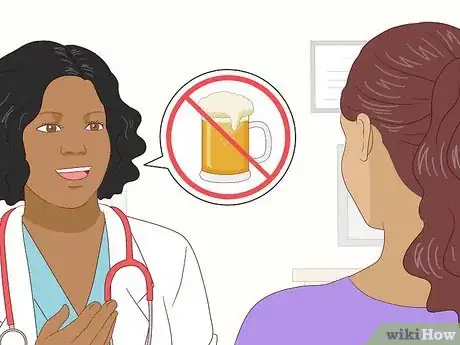
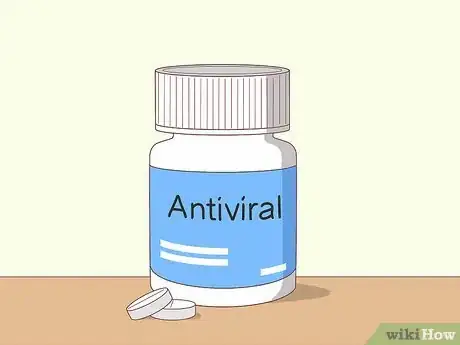
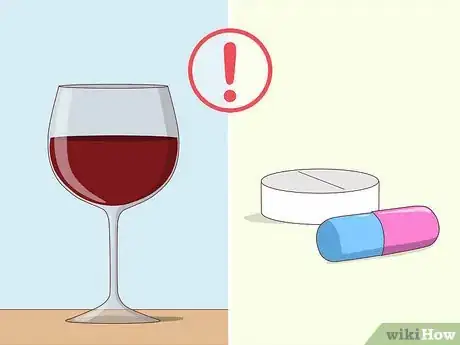
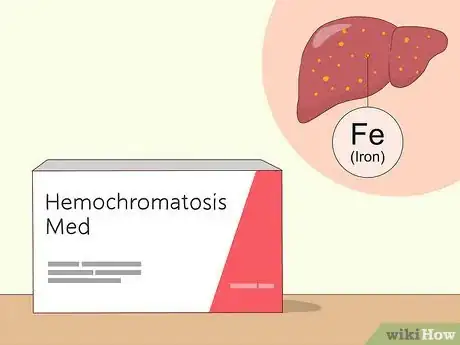

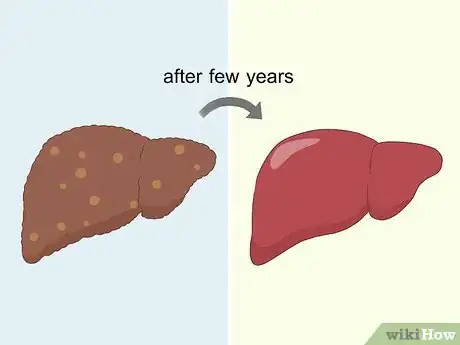
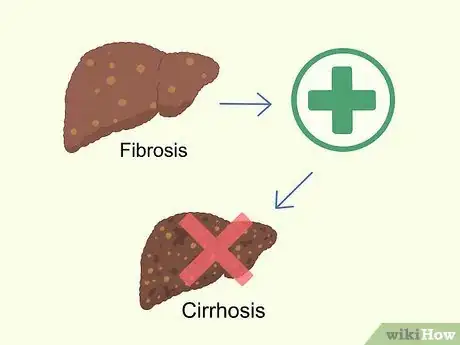

























































Medical Disclaimer
The content of this article is not intended to be a substitute for professional medical advice, examination, diagnosis, or treatment. You should always contact your doctor or other qualified healthcare professional before starting, changing, or stopping any kind of health treatment.
Read More...